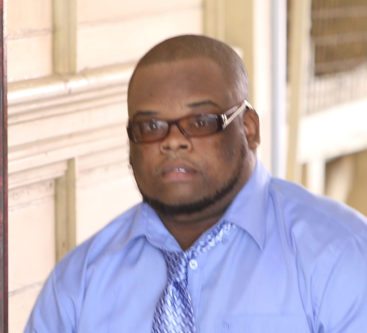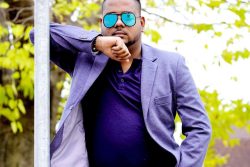Travis McDougall was yesterday sentenced to 25 years in jail for the killing of businessman Ashok Raghoo, who was fatally shot during a robbery at the Vlissingen Road and Regent Street traffic light.
He had been found guilty of manslaughter by a 12-member mixed jury on May 19, but his sentencing had been deferred to yesterday to facilitate a probation report.
McDougall was initially charged alongside Jermaine Otto, called “Fungus,” who was among 17 prisoners who died in the Camp Street Prison fire last year, with killing the businessman during a robbery on August 18, 2014.
In a passionate plea for mitigation, attorney Nigel Hughes begged Justice Navindra Singh to be merciful towards his client, stating that McDougall was deeply remorseful for the loss of life.
Hughes said while it was no excuse, missteps occur in life and asked the court to view the conviction against his client, as an isolated incident, given that he has no antecedents.

Acknowledging that the influence of friends and one’s living environment were no excuse to commit crimes, Hughes nevertheless argued that the charge against his client stemmed from his association with “Fungus,” who had had brushes with the law.
According to counsel, his client has displayed exemplary behaviour while in prison, and expressed the belief, that if given a chance, would be capable of redemption.
To this end, Hughes begged the judge to visit the young man with a sentence which would give him “hope.”
He asked the court also, to consider that McDougall is still very youthful, and can make valuable contributions to society on his release.
According to Hughes, not only is his client very sorry for the death of Raghoo, but also for the disruption it caused to the lives of his wife and daughters.
For her part, Prosecutor Tuanna Hardy asked the court to impose a sentence, commensurate with the offence committed. She reminded the court that McDougall’s actions placed the public in danger, as other innocent motorists were around at the time of the shooting.
Hardy then asked the court to consider that Raghoo’s wife, who also sustained gunshot injuries, could have lost her life as well.
The prosecutor argued, that not only were the Raghoos robbed of material things, but of a husband and father also.
Given a chance to speak, Mc Dougall professed his innocence. He said he was “sorry the jury din believe me.” However, he acknowledged that a life was lost for which he expressed condolences and apologies to Raghoo’s family.
“Please for mercy, but I maintain my innocence,” a tearful Mc Dougall said in a soft tone, adding that he was frustrated and misses his son.
In response, Justice Singh said he had one sentence in mind, but after Hughes’ address, thought of a lower one. The judge, however, told Mc Dougall, that he failed to “back up,” his attorney’s submissions. “Mr Hughes can put all the flowers on the ground, but you have to bring them to me,” he told the convict.
Justice Singh said he thought himself a fair judge, though he is criticized by relatives of both the deceased and accused, and even the public, but noted the importance of his duty to balance justice by considering both aggravating and mitigating factors.
The judge enquired from McDougall whether he participates in any of the programmes offered by the prison. He answered in the affirmative, explaining that he is involved in church activities. He said he is also in charge of his dormitory, to the extent that he ensures bed spaces are provided for new prisoners and would also report to prison officers any disputes or fights which may erupt.
Admonishing the convict to continue being of good behaviour, as it can contribute to him being paroled, Justice Singh imposed a 25-year sentence, ordering that time spent on remand be deducted by prison authorities.
The jury had unanimously acquitted the convict on the capital offence, but by a proportion of 10 to 2 found him guilty on the lesser offence of manslaughter.
Wife of the deceased, Shirzaydah Raghoo, in her testimony, had identified McDougall as the rider of the bike from which the killer gunman dismounted. She had told the court that she clearly saw the faces of both McDougall and the shooter.
Raghoo had recounted that Ashok, who was a miner, had travelled out from the interior some days before he was killed, and had gone to the Guyana Gold Board, where he uplifted a cheque for $4 million. Thereafter, they went to Citizens Bank, where he cashed the cheque.
She said that on the day in question, they left home together around 12.45 pm to transact business in the city; the money was in a black haversack.
On Vlissingen Road, the witness recalled, her husband brought their car to a halt at the traffic light, which indicated red at the intersection with Regent Street. Almost immediately, the woman said, she saw a motorcycle ride up alongside her husband’s window, which was halfway up. She recalled that a man dismounted and demanded the bag, but her husband refused and was shot in the chest. Raghoo said the man then turned and shot her in the right foot, when she tried to grab the haversack, which was in the backseat. The couple was also robbed of a firearm and cellphones.
McDougall’s story was that he had nothing to do with the commission of the offence and was elsewhere at the time. His caution statement, which was admitted in evidence, however, said he told police that he had ridden the motorcycle from which the shooter had dismounted.
Hughes had argued that his client never voluntarily gave the statement, but it was obtained after lawmen applied electric shocks to his client’s genitals with a taser.
The court had heard from the statement that McDougall told police that Otto, whom he knew from school, asked to be dropped off in Kitty. However, at the traffic light at the intersection of Regent Street and Vlissingen Road, McDougall’s statement said, Otto jumped off the motorbike and darted to the Raghoos’ burgundy car.
Thereafter, the court heard from the statement, McDougall said he heard shots, followed by “Fungus” running back to the motorcycle with a black bag and shouting, “Leh we guh! Leh we guh!” The statement quoted the convict as telling police that later that night he heard that the driver of the car had died.
Leading his defence in unsworn testimony, however, the convict had told the court that he was innocent of the charge. His story was that at the time of the shooting, he was at the Jialing store, where he and a relative had taken a motorcycle to be repaired.







